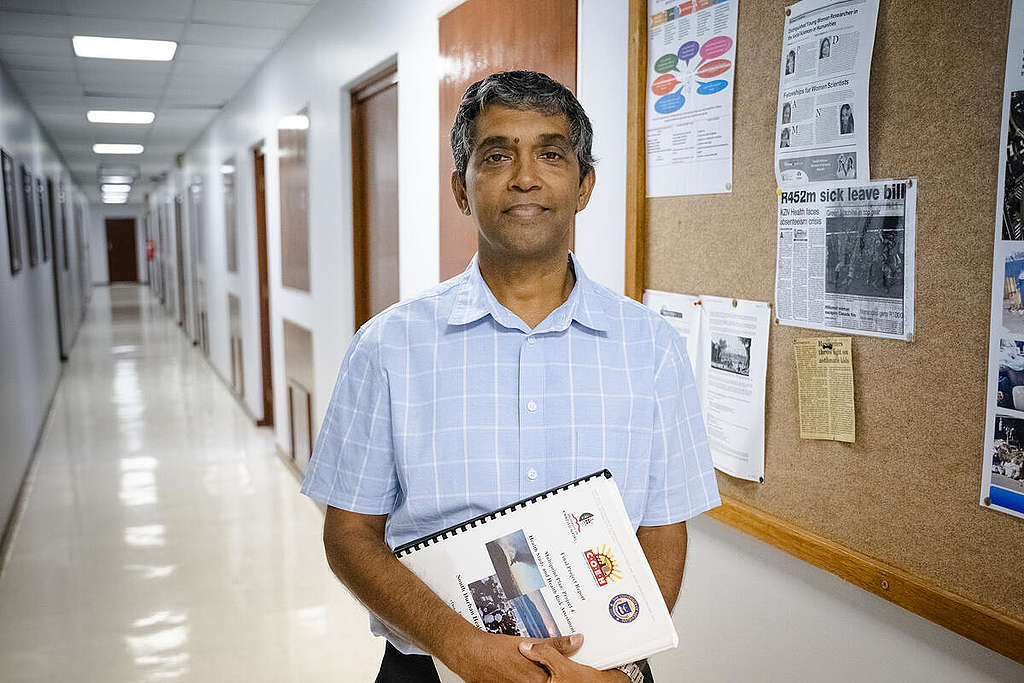
The "just-transition" cannot only focus on how the new green world caters for those affected by the energy transition, it must also see to those that have to live with the legacy of the old polluted world. Communities such as those in South Africa's South Durban Basin are trapped in a cycle of poverty and illness imposed by oil giants.
South Durban, home to more than 250,000 people, has historically been a high pollution zone in South Africa. Despite the gradual reduction in traditional pollutants such as sulphur dioxide, other pollutants such as particulate matter and oxides of nitrogen continue to be elevated in the community.
Typical of many such communities, established to serve as a labour pool to nearby industry, residents are at the margins of vulnerability, as large numbers of people in these communities are unemployed or receiving low incomes.
South Durban represents an example seen globally, and sharply exposed during the Covid-19 pandemic, of when multiple vectors of inequity and injustice converge into a perfect storm that influences health and further fuels a downward spiral of communities. The evidence for the social determinants of ill-health is convincing. Social determinants drive nutrition, education and residence. Residence, as seen in South Durban, the Vaal Triangle or the Highveld, is additionally a key determinant of exposure to pollutants.
Knock-on effect of poor health due to air pollution
The evidence for adverse health outcomes and air pollution is well established. South Durban communities have contributed living case studies for this evidence base: researchers have documented pollutant-related impacts on acute lung outcomes, including symptoms, lung function and emergency health service usage.
Of concern is the evidence for neurocognitive effects related to exposure to pollutants, such as metals and the polycyclic aromatic hydrocarbons: evidence for loss in intelligence quotient (IQ) points, learning ability, attention span and concentration in children are seen. Unfortunately, many of these outcomes are subtle at a population level, but potentially substantial at an individual level.
The findings that pollutant-related effects may begin its impacts on health in-utero implies that the newborn child is already disadvantaged at time of birth. The adverse effect of pollutants on the organ development stage of the growing foetus, particularly on lungs, heart and brain, results in a child born already compromised.
The work on infant lung function and neurocognitive assessments in newborns, followed up through latter childhood provides the evidence that those affected in the uterus before birth follow a different trajectory as they age, and these may then become the precursors of diseases in adulthood. Evidence that pollutants may have an epigenetic impact (changing of the genetic structure resulting in increased risk for an adverse outcome) in-utero through to early childhood is increasing.
Impact across generations
These epidemiological studies on air pollution and health outcomes indicate that effects are felt across a generation. The exposures experienced during pregnancy and consequences in the newborn and early childhood compromises that child's ability to achieve their full potential at school or in employment. Coupled with the other social determinants, these youngsters can become trapped in the pollutant-poverty paradigm, preparing their communities for the next generation of similarly trapped youth.
Research is emerging that a relationship exists between social determinants and air pollution, and the modification of health effects arising from dual exposure to these risk factors. This implies that the combined effects of exposure to these risk factors are greater than exposure to these factors individually.
The Covid-19 epidemic provided a clear example to this, and because the outcomes were easily measurable (severe Covid-19 disease and Covid-19 death), and comparable (poorer, marginalised communities vs well resourced communities), there was a vocal response with the media, non-governmental organisations and activists, bring pressure to bear on governments to act.
However, this is less obvious with environmentally-related outcomes, where exposures of the parents impact on the health of children, in subtle but disabling contexts, with vested economic interests from corporates and state. Hence a less vocal response.
Just transition must address impacts too
The emerging civil society voice on the climate crisis, government responses and the sound bites of multinational corporations have not yet translated into climate action that materially improves the social and health conditions for the historically pollutant-affected communities.
South Africa's Presidential Climate Commission has made "the just-transition" its slogan. However, the "just-transition" cannot focus on how the new green world caters for those affected by the energy transition, but also those that have to live with the legacy of the old polluted world. That legacy will pervade for at least two generations, not just in terms of economic/job losses in these communities, but prevailing environmental contamination and persistent emissions from pollutant stores such as soil and water.
This article was originally published by Daily Maverick on 28 November 2022.
Prof Rajen Naidoo is the Head of Discipline: Occupational and Environmental Health at the University of KwaZulu-Natal based in Durban, South Africa
Guest authors work with Greenpeace International to share their personal experiences and perspectives and are responsible for their own content.






